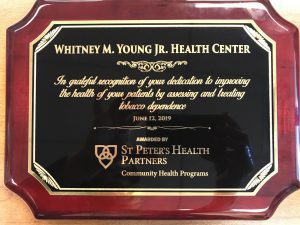
St. Peter’s Health Partners this week recognized Whitney M. Young, Jr. Health Center for its dedication to improving the health of its patients by assessing and treating tobacco dependence.
 On June 12, Katherine DeRosa, vice president of mission services for St. Peter’s Health Partners, presented an award to David Shippee, president and CEO of Whitney M. Young, Jr. Health Center, and Theodore Zeltner, M.D., Whitney M. Young’s chief medical officer.
On June 12, Katherine DeRosa, vice president of mission services for St. Peter’s Health Partners, presented an award to David Shippee, president and CEO of Whitney M. Young, Jr. Health Center, and Theodore Zeltner, M.D., Whitney M. Young’s chief medical officer.
“As part of our ministry at St. Peter’s Health Partners, we are committed to working with the community to improve the health of its residents and their quality of life, particularly the poor and vulnerable,” DeRosa said. “Smoking cessation is critical in serving this mission. Whitney Young, which has demonstrated its dedication to the health of its patients by implementing its own tobacco cessation policies, is an invaluable partner as we strive to better the lives of Capital Region residents.”
As part of its efforts, Whitney Young has implemented its smoking cessation policy at all on-site and off-site medical and behavioral health locations. The policy aligns with the U.S. Department of Health and Human Services’ five major steps to intervention. Known as the “5 A’s,” the steps include: asking every patient at every visit about their tobacco use; advising them clearly to quit; assessing if they are willing to quit; assisting them to quit; and arranging follow-up contact. This policy is also supported throughout the SPHP system by SPHP’s Community Health Programs. 
SPHP Community Health Programs facilitates the Health Systems for a Tobacco-Free New York grant, funded by the New York State Department of Health Tobacco Control Program. Staff work with behavioral health and health care systems, such as Whitney Young, to improve the reach and delivery of evidence-based tobacco dependence treatment throughout the Greater Capital Region. They work specifically with hospitals, community health centers, federally qualified health centers, and mental health and behavioral health agencies, with a focus on agencies and organizations that serve people with low education, low income, or serious mental illness.





